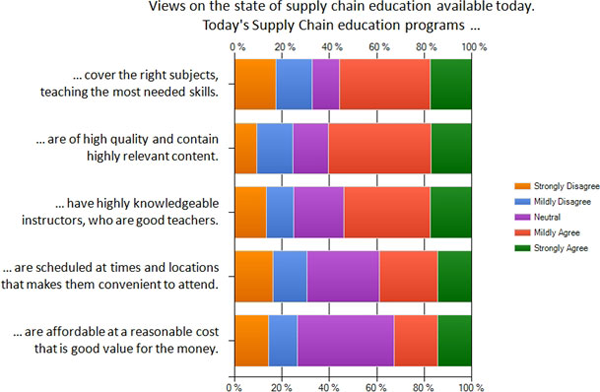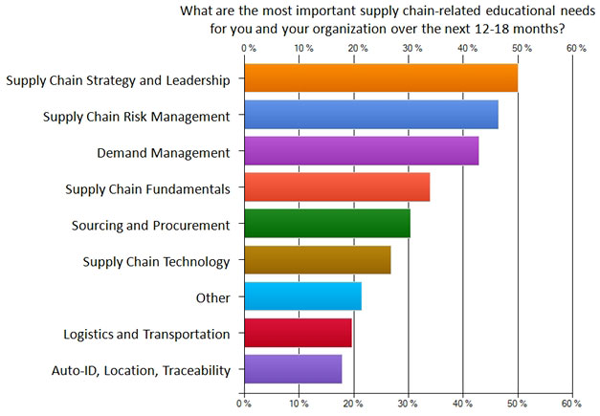|
By Bill McBeath
Posted with permission from SupplyChainBrain
As shown in Figure 1 below, people feel lukewarm about how well we are doing in supply chain education. Are existing supply chain education programs covering the right subjects and with good content? Sort of. Do they have great instructors? Not really. And are courses convenient to attend and reasonably priced? No!

Figure 1 – State of Supply Chain Education
So there is definitely room for improvement. In fact, the comments we received on the state of education tended to be more negative than the survey numbers above suggest. For example one person said, “Offered programs are parochial in nature, designed to drive sales of a vendor’s tools or services, or are too generic to be of value. For example, [a major prestigious university] doesn't even understand its own legacy in systems thinking. Supply chains are complex and there are no easy fixes. Grossly simplified views perpetuate myths and drive the wrong solutions.” Not exactly a resounding endorsement. Some comments were even harsher, which we won’t publish here as they would be considered “flaming” if this were a blog.
Less Theoretical, More Practical
By far the most common comment on the state of supply chain education today was that it needs to be much less theoretical and more grounded in reality, taught by people with industry experience. There were many dozens of comments on this themehere are a few cogent examples:
- “There is a significant lack of operating experience in the academic ranks. We need experienced executives teachingreal supply chain people from the industry as part of the programrather than educated PhDs who never worked in the business.“
- “Most of the programs result mainly in just creating awareness. Rarely do participants get a solution for their real problems.”
- “We need practical training that can be put into actual use, exercise-oriented and hands-on experience with the tools being used today. Taking it from the theoretical into the practical and addressing key topics from a business perspective including risk, sustainability, etc.”
- “Focus on how to get the job done in daily workhow to convert the business decision into supply chain parameters to formulate a sustainable supply chain towards the customer.”
Another comment in particular highlights the difference in mindset between the academic and practitioner when it comes to what and how they teach:
- “Many academics surround themselves with research which is nothing more than a new twist on an old idea. Some have value … but most don't. The academic approach does not assimilate true responsibility. They are generally given a blank slate. To be effective is to understand the constraints and succeed within these boundaries. It can and is being done in industry.”
2011 Supply Chain Education Priorities Strategic View is Key
We also wanted to know what the most important education needs are for 2011. As shown in Figure 2 below, Supply Chain Strategy and Leadership was ranked as the most important area. Strategy skills, conceptual problem solving, supply leadership, and integrated planning were some of the most frequently commented on needs. This is an area near and dear to ChainLink Research as we have been writing for years about the need for supply chain professionals to be able to speak the language of the CEO and the board, translating supply chain improvements into financial and strategic terms. One comment emphasized this point: “It is critical to teach the impact of good supply chain management on financial and company performance and how to communicate that.” Another emphasized the “. . . need to understand supply chain management’s pivotal role in a firm’s strategy to gain and maintain competitiveness.”
Many comments from survey participants suggested that communication skills are key. As one person said, “Verbal and written communication skills are critical as they impact how you as a Supply Chain Professional are viewed. It doesn't bode well for the industry, nor can we make an impact personally, if we cannot communicate well.” One person said, “We need to teach how to present your case to upper management for changes needed.”

Figure 2 – 2011 Supply Chain Education Priorities
|